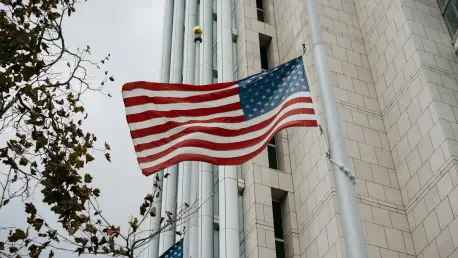Centene Corporation, a leading player in government-sponsored healthcare programs, has found itself embroiled in a significant legal quagmire, with allegations of securities fraud and corporate misrepresentation taking center stage. This high-profile class-action lawsuit has instilled a sense of uncertainty among investors, resulting in notable volatility in the company’s stock value. The focus of the legal action revolves around accusations that Centene misled its investors by not fully disclosing its compliance issues related to state Medicaid billing and its pharmacy benefit management operations. These issues purportedly occurred over a protracted period, compounded by potential concealed investigations by relevant authorities. Investors now face pressing questions regarding Centene’s transparency and governance, with ramifications that may resonate far beyond the company itself. As stakeholders unravel the intricacies of this legal battle, a deeper examination of how Centene navigates these stormy waters provides critical insight into the resilience and adaptability of companies operating within the dynamic healthcare sector.
Navigating the Legal Maze
The class-action lawsuit against Centene is particularly noteworthy due to its potential to set new precedents in the regulatory landscape of managed care. Accusations of securities fraud are serious, not just because of the immediate financial implications but also due to their potential to erode trust among investors. Over the last few years, Centene has been accused of making false statements that obscured its compliance issues, leading to a growing chorus of discontent among stakeholders. The legal proceedings suggest an intricate web of financial liabilities that Centene may face if found guilty. This growing uncertainty is reflected in the market, where Centene’s stock has seen fluctuations, indicating waning investor confidence. As the legal battle unfolds, Centene must address these allegations strategically, recognizing the potential long-term implications. Its response could serve as a template—or cautionary tale—for similar companies operating within heavily regulated spaces. Addressing these legal challenges and communicating transparently with shareholders is crucial if Centene is to stabilize its financial standing and reputation.
Impact on Market and Shareholders
The repercussions of these legal proceedings on Centene’s market position and shareholder confidence cannot be overstated. The company’s stock has already experienced a marked decline in response to the unfolding events, sparked by investors’ fears about the veracity of previous financial disclosures. This drop reflects broader apprehensions that extend beyond the immediate financial losses; it is symptomatic of a deeper concern over corporate governance standards within Centene. Shareholders, wary of potential litigation costs and uncertain future earnings, may call into question the company’s strategic direction and its leadership’s ability to mitigate these risks effectively. The influence of these concerns is not restricted to Centene alone. The entire managed care sector is watching closely, recognizing that increased scrutiny and pressure for enhanced transparency may become the new norm. These dynamics highlight the imperative for Centene to not only address the ongoing litigation but also to reassure investors about its future readiness to handle compliance and disclosure more effectively.
Broader Implications for the Managed Care Sector
The challenges facing Centene suggest ripple effects that could have significant implications for the managed care sector. The class action serves as a watershed moment, signaling to industry players the urgent need to scrutinize their compliance practices and corporate governance structures more thoroughly. For companies such as Molina Healthcare and Elevance Health, this development might act as a cautionary threshold, prompting preemptive reviews and adjustments in their operational and reporting frameworks. Heightened regulatory oversight looms on the horizon for similar entities that might be operating within comparable frameworks and facing similar allegations. Consequently, firms must prioritize creating robust compliance mechanisms that can withstand the rigorous demands of regulatory scrutiny, focusing on transparency in financial disclosures, particularly in earnings reporting and compliance documentation. Centene’s predicament underlines the critical need for improved industry-wide standards, not simply as a response to current challenges, but as a proactive measure to safeguard against potential future threats to investor trust and credibility.
Prospects for Recovery and Future Strategies
As Centene maneuvers through these legal complexities, attention now turns to the strategies it may employ to restore trust and ensure compliance with regulatory expectations. Historically, Centene has opted for settlements without admitting culpability, a tactic that may no longer suffice in the eyes of shareholders demanding accountability and action. The company must adopt not only a strategic approach to current lawsuits but also reevaluate its internal processes and risk management systems to prevent similar issues from arising in the future. Investors are looking for tangible changes—whether through leadership restructuring, bolstering compliance teams, or enhancing disclosure practices—that can help rebuild confidence and reflect a genuine commitment to transparency. Additionally, Centene may need to foster a culture of compliance beyond just its Medicaid billing practices to encompass broader aspects of its operations. By implementing these changes, Centene could position itself to emerge from its current difficulties, potentially transforming its challenges into opportunities for strengthening its market presence and setting a precedent for industry standards.
Lessons for the Future
Centene Corporation, renowned for its role in government-funded healthcare programs, is currently embroiled in a substantial legal predicament, accused of securities fraud and corporate misrepresentation. This prominent class-action lawsuit has stirred doubt among investors, leading to notable fluctuations in Centene’s stock price. At the heart of the legal challenge are allegations claiming that Centene failed to fully inform its investors about state Medicaid billing compliance issues and its pharmacy benefit management operations. These challenges reportedly spanned an extended period, exacerbated by potentially undisclosed investigations by authorities. Consequently, investors are scrutinizing Centene’s transparency and governance, with implications that could extend beyond the company itself. As stakeholders dissect this legal entanglement, examining how Centene maneuvers through these turbulent times reveals significant insights into the tenacity and flexibility of firms within the ever-evolving healthcare industry.









